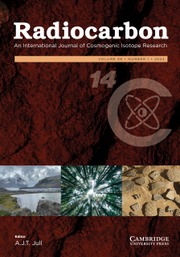Article contents
The Chronology of Medieval Copenhagen
Published online by Cambridge University Press: 04 December 2019
Abstract
Historical sources reveals that Copenhagen was founded in the late 12th century AD by Bishop Absalon. However, during the excavation for the new metro in central Copenhagen a previously unknown early medieval cemetery was discovered and excavated at the Town Hall Square. Radiocarbon (14C) analysis was conducted on the 9 individuals found in situ, together with 11 individuals from the other early medieval cemetery in Copenhagen, belonging to the St Clemens church. The radiocarbon analysis places the onset of the cemeteries to the early 11th century AD and therefore questions the age of Copenhagen and hence the archaeological and historical perception of the Danish historical record. Here a detailed account of the radiocarbon-based Bayesian model is presented.
Information
- Type
- Conference Paper
- Information
- Radiocarbon , Volume 61 , Issue 6: Radiocarbon 2018 Conference Proceedings Trondheim, Norway, June 17–22, 2018 Part 2 of 2 , December 2019 , pp. 1675 - 1683
- Copyright
- © 2019 by the Arizona Board of Regents on behalf of the University of Arizona
Footnotes
Selected Papers from the 23rd International Radiocarbon Conference, Trondheim, Norway, 17–22 June, 2018
References
REFERENCES
- 4
- Cited by

